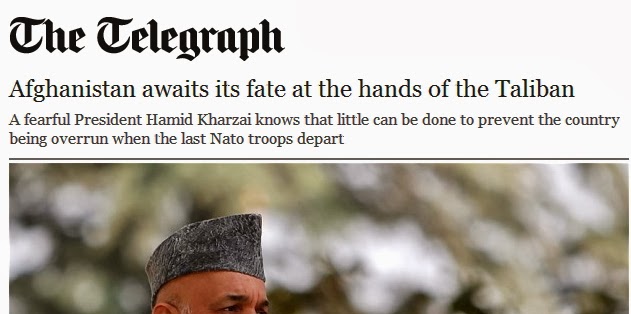A fearful President Hamid Kharzai knows that little can be done to prevent the country being overrun when the last Nato troops depart
In an interview with the BBC, six months before leaving office, President Hamid Karzai has put the boot into the British – and the West – in terms as extreme as any he has used before. “On the security front,” he claimed, “the entire Nato exercise was one that caused Afghanistan a lot of suffering, a lot of loss of life, and no gains because the country is not secure.” He even made the far-fetched claim that Nato is colluding with the Taliban.
It would be a tragedy if the 444 British troops who have given their lives in Afghanistan died in vain. Yet if the mission has indeed failed, it reflects President Karzai’s own lack of leadership, and his refusal even to recognise a major problem in his country – runaway corruption.
In Kabul the other day, I was told a story about the members of the extensive Karzai family. One brother had complained to my friend about the obscene amount of money another member of the family was making – something like a million dollars a week – even though, he boasted, he already had $950,000 in the bank. This in one of the poorest countries in the world, with millions of its inhabitants living below the poverty line.
One would have thought this was the stuff of revolution, but so far the fatal spark seems to be missing. Instead, nemesis, in the shape of an increasingly violent Taliban, stalks the land. At a pre-election party given by one of the few grand families left in Kabul – nominations for Karzai’s successor closed at the weekend, with the elections due next April – I found myself talking to a former minister of the interior.
How were things? I asked. “Considerably worse than before the last election,” he replied. “Everything’s up. The number of Taliban attacks, the number of suicide bombings, car bombs, ambushes and kidnappings, the number of casualties, civilian and military…” The difference, of course, was that whereas in 2009, the dead were mainly Nato soldiers, now they are members of the Afghan army and police.
I asked other acquaintances for their view. “Everything’s upside down,” said one American, a long-time Kabul resident. “The Americans are in total confusion.” She had been negotiating over an annual grant for an education project she runs. A meeting with a senior US official was cancelled at short notice. A few days later, she got an email from him saying he had been transferred to Turkey, leaving her high and dry.
On the streets of the capital, however, the consumption is more conspicuous than ever. Huge 4 x 4s, often brand-new and stuffed with guards, block the traffic-choked streets.
Rush hour is so bad that you often have to allow a good hour to keep an appointment. The traffic jams produce their own theatre. Beggar children tote cans of foul-smelling smoke – allegedly to ward off evil spirits. Agile boys clutching rags pretend to clean your windscreen when you are brought to a halt: two wipes are usually enough to produce an appealing palm. Foreigners usually ignore the beggars, but I noticed with a twinge of shame that Afghans often drop a small note into the lap of a cripple – male or female – sitting mute on the pavement.
For anyone of note, security is obviously a preoccupation. Politicians, diplomats, big businessmen and warlords large and small – all live behind a screen of barriers, chicanes and armed guards in pillboxes, which seal them off from the everyday hazards of a country at war.
Yet despite all the security, the death toll keeps rising. Almost every day, one hears of yet another Taliban suicide bomb, IED or ambush. The scale of the killings was brought home when I heard of the death of a friend. Noor Akbari, a talented agriculturist, was killed – apparently by the Taliban – a month or so ago for the “crimes” of working for the government and being from the Panjshir Valley.
A member of a well-known family from the same village as the late guerrilla leader Ahmad Shah Massoud (killed by al-Qaeda two days before 9/11), Noor had a famous brother, Yunus – Afghanistan’s first nuclear physicist, murdered after the 1978 coup. Noor worked for the UN in Afghanistan for many years and was engaged on a ministry of agriculture project in Logar, known for its Taliban penetration. Travelling in convoy, his party was stopped by gunmen. Noor and another Panjshiri were ordered out of their cars and summarily shot by the roadside. Such ruthless Mafia-style killings are now commonplace.
There are some bright patches. The villagers of Panjwai, a district of Kandahar that rebelled against Taliban intimidation and domination earlier this year, are keeping them at bay. But they are an exception. The Taliban’s hold in many parts of the country is worryingly strong. Pakistan, as far as one can tell, is still behind them. So far the Islamists appear to have played little part in peace talks, such as they are – although in his interview, President Karzai signalled his willingness to welcome them back into government.
Many Afghans I spoke to believe the Taliban is playing a waiting game. When the time is right – after the last Nato troops have gone, by the end of next year – they will make their move to take control. This is a possibility that the British, for one, seem to be taking extremely seriously. But what we and the Americans can do to prevent it is another matter.
Sandy Gall is a journalist and author, and founder of Sandy Gall’s Afghanistan Appeal, which provides artificial limbs for the country’s wounded

